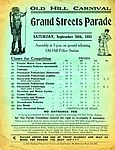 Carnival poster
Carnival poster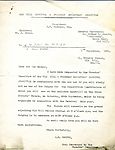 Invitation to judge competition
Invitation to judge competition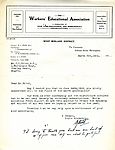 Request for money
Request for money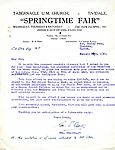 Invitation to act as chairman
Invitation to act as chairman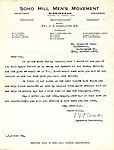 Invitation to speak
Invitation to speak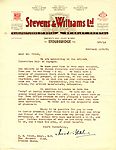 Invitation to Olympia
Invitation to Olympia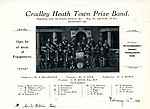 Town Prize Band letterhead
Town Prize Band letterhead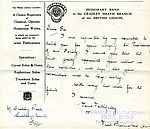 Thank you letter to Charles
Thank you letter to Charles

Charles Sitch's commitment to the Black Country and its people is clear from his work as a union leader, Labour M.P. and Justice of the Peace, but Charles was also heavily involved in the social life of the district.
Although the Museum holds only Charles Sitch's correspondence from the late 1920s and early 1930s, there is enough to show the wide range of organisations with which he was associated. Some examples are reproduced here.
The poster gives details of the Old Hill Carnival Parade held in 1931. Charles was invited to act as one of the Judges for the competition. The event was organised by the Old Hill Carnival and Friendly Society. A number of other letters in the Museum's collection suggest that Charles was a keen supporter of Friendly Societies and their activities. He was an honorary member of the Ancient Order of Foresters. Members believed it to be their duty to assist their fellow men who fell into need as they "walked through the forests of life". Such societies had grown from the simple premise that if a group of people contributed to a mutual fund, then they could receive benefits at a time of need. By the late 1800s there were 27,000 registered societies.
The letter requesting money came from the Workers' Educational Association. This was an organisation established in 1903 by Albert and Frances Mansbridge. It promoted the higher education of working men, and later women. bringing together supporters of working class education from the churches, the Cooperative Movement, trade unions and the University Extension Movement. It is possible that Charles appreciated the value of higher education for working class people, as he had himself benefited from a two year course at Ruskin College, Oxford, funded by the Chainmakers' and Strikers' Association.
Also included here are two letters, one from the Tabernacle United Methodist Church, inviting Charles to act as Chairman at a Springtime Fair, the other from the Soho Hill Men's Movement, inviting him to speak at its Sunday Service. They are two of many dozens of invitations sent to Charles from various churches in the district and from brotherhoods, whose meetings were for the worship of God and the promotion of a true spirit of fellowship.
Charles was also firmly established amongst the business community of the Black Country. He was associated with the Rotary Club of Kidderminster, Rotary being an organisation of leading business men, "embracing representatives of nearly every trade and profession, its objects are the encouragement of high ethical standards in commercial life, the promotion of social intercourse and fellowship among business men and the quickening of individual interests in everything affecting the public welfare." ( Rotary Club of Kidderminster letterhead 10.12.1930)
The letter from Stevens and Williams Ltd, inviting Charles to the British Industries Fair at Olympia, certainly seems to support the idea that Charles was held in high regard by the business community. It also gives some indication of the pride Charles felt for the district and its industries.
Stevens and Williams Ltd traded under this name until the 1930s, when the company became Royal Brierley Crystal to signify its appointment as Royal British Glassmakers. The company is still trading today, although it is now operated by Dartington Crystal. The Royal Brierley Crystal Experience is situated adjacent to the Black Country Living Museum on the Tipton Road. Its heritage museum traces over 200 years of the company's history.
Music was also an important part of Charles' community life. He was the President of the Cradley Heath Town Prize Band. A photograph of the band is included on its letterheads, one of which is reproduced here. He was also, for some time, the Vice President of the Cradley Heath and Old Hill District Amateur Operatic Society, sometimes taking the romantic lead in performances.
It is possible to see, in all of these activities, a commitment to helping others and to the idea of self-help and self-improvement. Charles not only gave his time, but also his money. He made donations to the organisations already mentioned. In addition he contributed to a wide range of sporting activities, including football, cricket and bowling clubs, and school sports prize funds. He provided prizes for charity whist drives and contributed to such causes as the Quarry Bank Aged People's Christmas Treat Committee and the Blackheath and District Old People's Tea Fund.
By 1930 Charles' correspondence begins to give some indication of the financial pressures placed on him. In reply to a letter requesting the donation of a prize he wrote, "I would really like to help you at your whist drive, but during the last fortnight, I have had something like sixty different letters inviting me to contribute prizes for whist drives. I have never stinted myself with my responses to appeals, but really, the number now has got so serious that I am compelled to decline.' To another he wrote, 'I am sorry to say that I have had so many calls recently to render financial help to different institutions, that I am compelled to turn them down. Really every post brings me applications for subscriptions, and of course it is quite impossible for me to cope with them."
This was the situation in 1931, at the time of the general election, when Charles lost his seat, and with it his M.P.'s salary.
Rollover the captions in the box to see the available images in thumbnail format, click the caption to see the full-size image
| Reference: | 650 |
| Keywords: | |
| Archive Ref: | 2007/001/0018 |
| Updated: | Tue 17 Jul 2007 - 1 |
| Interpretation written by | Barbara Harris |
| Author's organisation | |
| Organisation's website |